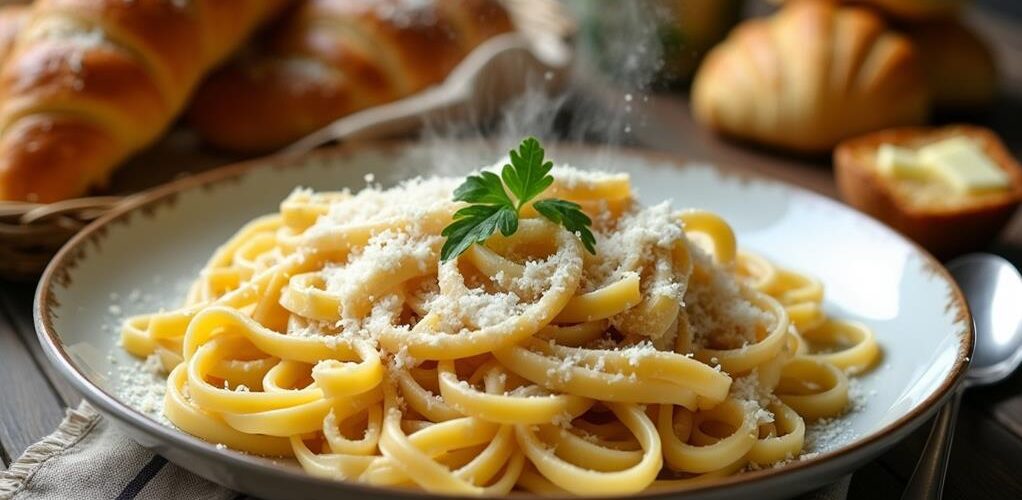
Maintaining a keto diet necessitates avoiding foods high in carbohydrates. Refined carbohydrates such as white bread and pasta can quickly disrupt ketosis. Sugary beverages, including sodas and fruit juices, add excessive carbs. Natural sweeteners like honey and maple syrup must be sidestepped. High-carb vegetables such as potatoes and corn, and dried fruits, like dates, exceed keto carb limits. Processed foods, starchy snacks, and sweetened yogurts often hide extra carbs. Low-fat diet foods typically replace fats with sugars. Many alcoholic beverages, especially sweet cocktails, derail ketosis. Explore more about how these choices impact your keto journey.
Key Takeaways
- Avoid refined carbohydrates like white bread, pasta, and rice due to their high carb content.
- Steer clear of sugary beverages, including regular sodas and fruit juices, which disrupt ketosis.
- Skip starchy vegetables like potatoes and corn as they contain high carb levels.
- Refrain from consuming dried fruits, which are high in concentrated sugars and carbs.
- Avoid sweetened yogurts and low-fat diet foods that often contain added sugars disrupting ketosis.
Refined Carbohydrates
Refined carbohydrates are a major dietary concern for individuals following a keto diet due to their high carbohydrate content, which can swiftly disrupt ketosis. Foods like white bread, refined grains, and pasta are particularly problematic.
For instance, a single slice of white bread contains approximately 13 grams of carbs, while a cup of cooked white pasta packs around 33 grams of carbs. Similarly, half a cup of cooked white rice contributes about 26.5 grams of carbs, making it difficult to stay within the stringent carb limits required for ketosis.
Additionally, traditional cereals, such as those commonly consumed at breakfast, can contain 20-30 grams of carbs per serving, further challenging the maintenance of ketosis.
Consuming refined carbohydrates can lead to significant blood sugar spikes, undermining the keto diet's objective of stabilizing blood glucose levels. This is especially detrimental as maintaining stable blood sugar is essential for the metabolic state of ketosis.
Fortunately, there are carb substitutes that can help mitigate these issues. For example, cauliflower rice is a popular low-carb alternative to white rice, and low-carb bread options are available to replace traditional white bread.
These substitutes allow individuals to enjoy similar textures and flavors without jeopardizing their state of ketosis, thereby supporting the dietary goals of the keto lifestyle.
Sugary Beverages
While refined carbohydrates pose significant challenges to maintaining ketosis, sugary beverages present an equally formidable obstacle for those on a keto diet. High-carb content in sugary drinks like regular sodas and fruit juices can quickly derail ketosis.
For instance, a 12-ounce can of Coca-Cola contains approximately 39 grams of carbs, and an 8-ounce glass of orange juice holds around 26 grams of carbs. These numbers far exceed the daily carb limits typically recommended for a ketogenic diet, making it difficult to remain in ketosis.
Even some diet soda options may contain harmful sweeteners, which can lead to increased cravings for sweet foods.
Alcoholic beverages also pose a risk, particularly beer and cocktails with sugary mixers. Some mixed drinks can contain over 30 grams of carbs per serving, further complicating efforts to maintain a low-carb lifestyle.
Even diet sodas, though carb-free, may lead to increased cravings for sweet foods, potentially resulting in higher overall carb intake.
To counter these challenges, adopting effective hydration strategies is essential. Opting for water, herbal teas, or black coffee can help maintain ketosis while ensuring proper hydration.
Additionally, considering sugar alternatives that do not impact blood glucose levels can be beneficial for those seeking occasional sweetness without compromising their keto goals.
Sugary Sweeteners
Steering through the intricacies of a keto diet requires a keen awareness of the types of sweeteners consumed, as sugary sweeteners can quickly disrupt ketosis.
Natural sweeteners like honey and maple syrup, while often perceived as healthier alternatives to refined sugar, are ill-suited for a ketogenic lifestyle. Honey contains approximately 17 grams of carbs per tablespoon, and maple syrup has around 13 grams. Such high carb content can rapidly exceed daily carb limits and cause blood sugar spikes, thereby hindering the body's ability to maintain ketosis.
Additionally, sweeteners like maltodextrin have a high glycemic index and can spike blood sugar levels rapidly, making them unsuitable for keto.
The consumption of high-carb sweeteners provides minimal nutritional value, further exacerbating their unsuitability for a keto diet. The primary goal of ketosis is to keep carbohydrate intake low enough that the body turns to fat for fuel. Consequently, sugary sweeteners, despite their natural origins, are counterproductive.
For those committed to a ketogenic lifestyle, the use of sugar alternatives like stevia or erythritol is advisable. These low-carb sweeteners have negligible carbs and do not affect blood sugar levels, making them ideal for maintaining ketosis.
Starchy Vegetables
Maneuvering a ketogenic diet necessitates avoiding starchy vegetables due to their high carbohydrate content, which can greatly disrupt ketosis. For instance, a medium-sized potato contains approximately 37 grams of carbs, making it unsuitable for those adhering to a keto regimen.
Similarly, sweet potatoes pose a significant challenge, offering about 26 grams of carbs per medium-sized unit. These amounts are far above the daily carb limit typically recommended for maintaining ketosis.
Additionally, non-starchy vegetables like leafy greens and cauliflower provide essential vitamins and minerals while keeping carb counts low, making them ideal for keto meals.
Corn is another high-carb vegetable that should be avoided, as it provides approximately 27 grams of carbs per cup. Even peas, often considered a healthier option, contain around 12 grams of net carbs per cup, making them a less favorable choice compared to low-carb alternatives.
To effectively manage a ketogenic diet, monitoring vegetable portions is vital. Aim to derive only 12-15 grams of net carbs from low-carb vegetables daily.
Non-starchy alternatives such as leafy greens, broccoli, and cauliflower are recommended to guarantee nutrient intake without compromising ketosis. Adhering to these guidelines helps maintain the metabolic state necessary for the benefits associated with a ketogenic lifestyle.
Dried Fruits
In addition to starchy vegetables, dried fruits are another category to be cautious of on a ketogenic diet due to their high carbohydrate content. Dried fruits, such as Medjool dates, contain approximately 18 grams of carbs per piece, making them high in sugars that can disrupt ketosis.
The dehydration process concentrates the sugars in fruits, meaning even small amounts can lead to excessive carb intake. Consuming dried fruits can quickly exceed the low carbohydrate allowance needed to maintain consistent ketosis, which is vital for the diet's effectiveness.
Mixed dried fruit, for instance, can contain around 31 grams of carbs per ¼ cup, greatly impacting daily carb limits on a keto diet.
To maintain ketosis, it is essential to monitor total carb intake and evaluate dried fruit alternatives. Fresh fruits are generally preferable over dried varieties, as they can be consumed in moderation without exceeding carb limits.
Here are some key points to review:
- Medjool dates: ~18 grams of carbs per piece.
- Mixed dried fruits: ~31 grams of carbs per ¼ cup.
- Dehydration process: Concentrates sugars, increasing carb content.
- Fresh fruit options: Better suited for keto due to lower sugar concentration.
- Monitoring intake: Important for maintaining ketosis.
High-Carb Condiments
Steering through the domain of high-carb condiments is fundamental for anyone committed to a ketogenic diet. Many common condiments, such as ketchup, contain approximately 3 grams of carbs per packet, rendering them unsuitable for a strict keto regimen.
Similarly, barbecue sauce often harbors around 4 grams of carbs per packet, primarily due to added sugars. These hidden sugars can considerably disrupt ketosis, a metabolic state essential for the success of a keto diet.
It's also critical to be aware of other potential pitfalls such as hidden carbs in processed foods, which can be especially prevalent in pre-packaged condiments.
Sweetened sauces, such as teriyaki and certain salad dressings, also present a challenge due to their heightened carb content. To navigate these pitfalls, it is imperative to scrutinize nutrition labels for hidden sugars and carb counts.
Pre-packaged condiments can easily derail ketosis if consumed in excess, undermining the diet's effectiveness.
For those seeking low carb alternatives, vinegar-based dressings or mustard offer flavorful options without the high carb counts associated with sugary condiments.
These alternatives allow adherence to a ketogenic diet without sacrificing taste. By making informed choices and opting for low carb alternatives, one can successfully maintain ketosis and achieve the desired outcomes of the ketogenic lifestyle.
Processed Snacks
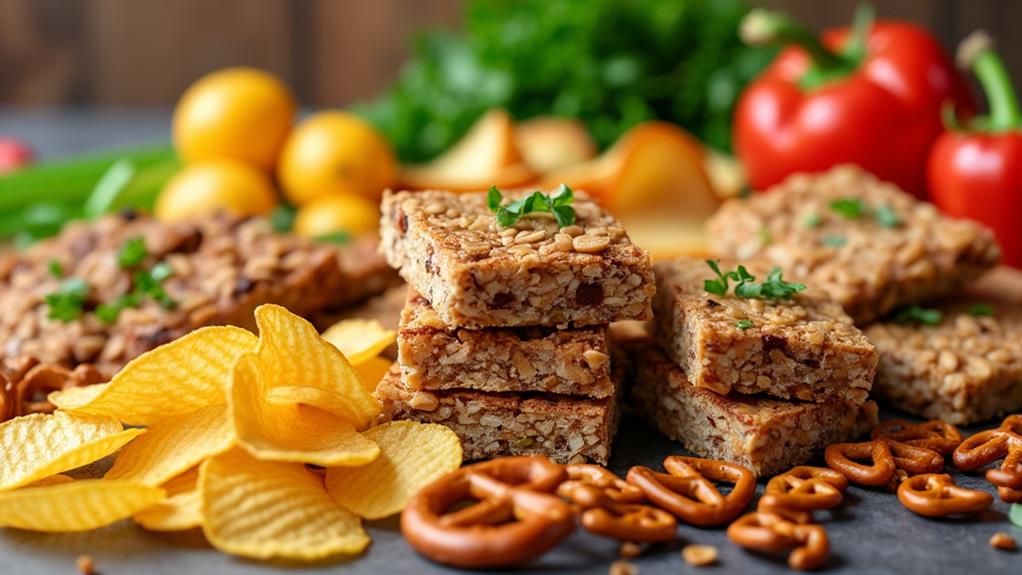
Understanding the impact of processed snacks on a ketogenic diet is essential for maintaining ketosis. Processed snacks such as chips and crackers often contain refined grains, greatly increasing their carbohydrate content, which can disrupt ketosis.
Many snack bars, although marketed as healthy, are loaded with sugars and syrups, with some containing over 20 grams of carbs per serving. Similarly, pre-packaged popcorn, a popular snack choice, can have around 15 grams of carbs per serving due to added flavorings and sugars.
Even granola, often perceived as a nutritious option, can exceed 30 grams of carbs per serving, primarily due to the presence of honey and other sweeteners. According to Mayo Clinic, understanding the distinction between ketosis and ketoacidosis is vital for safe ketogenic diet practice.
To adhere to a keto diet and maintain ketosis, it is advisable to evaluate snack alternatives that are low in carbs and rich in healthy fats.
Recommended low-carb alternatives include:
- Nuts such as almonds, which provide only 2.6 grams of net carbs per ounce.
- Cheese, which is a convenient and satisfying option.
- Avocados, rich in healthy fats and low in carbs.
- Hard-boiled eggs, a high-protein, low-carb snack.
- Olives, which are low in carbs and high in healthy fats.
Adopting these snack alternatives can help maintain ketosis while ensuring adequate intake of healthy fats.
Low-Fat Diet Foods
The allure of low-fat diet foods often lies in their promise of reduced caloric intake and health benefits. However, for those adhering to a ketogenic diet, these foods can be counterproductive. Low-fat yogurt and low-fat snacks typically contain added sugars and refined carbohydrates that disrupt ketosis. For instance, low-fat yogurts can have over 30 grams of carbs per serving due to sweeteners and flavorings, undermining the low-carb requirements of a keto diet.
| Food Type | Keto Concerns |
|---|---|
| Low-Fat Yogurt | High in added sugars, 30g carbs per serving |
| Low-Fat Snacks | High in refined carbs, disrupt ketosis |
| Rice Cakes | High glycemic index, spikes blood sugar |
| Pretzels | Processed carbs, lack nutritional value |
| Processed Low-Fat Products | Contain unhealthy additives |
Furthermore, low-fat snacks like pretzels and rice cakes often contain refined carbohydrates, which can hinder fat-burning processes essential to ketosis. Processed low-fat products may also include unhealthy additives and preservatives, compromising overall nutritional value. To maintain keto compliance and promote satiety, it is advisable to opt for whole foods containing natural fats, such as avocados or nuts. These alternatives not only support ketosis but also offer essential nutrients and sustained energy.
Sweetened Yogurts

Many individuals might be surprised to learn that sweetened yogurts can be a considerable source of hidden sugars, making them unsuitable for those adhering to a ketogenic diet. Flavored yogurts often contain upwards of 30 grams of carbohydrates per serving due to added sugars, which can disrupt ketosis and lead to blood sugar spikes.
Furthermore, choosing sweetened yogurts over plain varieties can also result in higher calorie intake, further complicating weight management. To maintain compliance with a keto diet, it is vital to practice diligent carb counting and opt for yogurt alternatives that align with keto principles.
Greek yogurt is a better option, but it is essential to select plain, unsweetened varieties to guarantee minimal carb intake. Many popular brands incorporate concentrated sugars, such as honey or syrups, which can greatly inflate their carb counts.
Key considerations for choosing keto-friendly yogurts:
- Check nutrition labels: Verify the carbohydrate content and confirm there are no added sugars.
- Avoid flavored yogurts: These often contain hidden sugars that can disrupt ketosis.
- Opt for plain Greek yogurt: This offers lower carbs and higher protein content.
- Be wary of "low-fat" labels: These products may compensate with added sugars.
- Explore yogurt alternatives: Consider options like coconut or almond milk yogurt for lower carb counts.
Alcoholic Beverages
Alcoholic Beverages
For individuals adhering to a ketogenic diet, alcoholic beverages can present a vital challenge due to their varying carbohydrate content. Many popular alcoholic drinks, such as beers and sweet cocktails, are high in carbs and can quickly exceed daily limits, making them unsuitable for maintaining ketosis.
For instance, a piña colada contains approximately 32 grams of net carbs, which can greatly disrupt ketosis. Additionally, individual responses to alcohol may vary greatly, influenced by genetic factors.
In contrast, opting for hard liquors like vodka, gin, or whiskey mixed with soda water can be a more suitable low carb cocktail choice.
Alcohol metabolism also poses a challenge for keto dieters. When consumed, the body prioritizes metabolizing alcohol over fats, delaying the onset of ketosis and potentially hindering weight loss efforts.
Sweetened liqueurs and cocktails with sugary mixers can lead to a considerable spike in carb intake, further complicating adherence to a ketogenic diet. As a result, choosing low-carb mixers or consuming spirits neat or on the rocks is vital for maintaining ketosis.
Moderation is essential when consuming alcohol on a keto diet. Tracking carb intake from alcoholic beverages is necessary to guarantee that ketosis is effectively maintained while still enjoying occasional low carb cocktails responsibly.
Frequently Asked Questions
What Foods Can You Not Eat on Keto?
Foods to avoid on keto include high-carb items like white bread, pasta, sugary beverages, starchy vegetables, and high-carb fruits. Instead, focus on keto meal prep featuring low carb snacks to maintain ketosis effectively.
What Are the Golden Rules of Keto?
The golden rules of keto are to limit carbs to 20-50 grams daily, prioritize healthy fats, moderate protein, and low-carb vegetables, avoid keto misconceptions, and engage in meticulous keto meal prep to maintain ketosis and nutritional balance.
What Are the Top 10 Keto Foods?
The top 10 keto foods include fatty cuts of meat, leafy greens, high-fat dairy, nuts, seeds, and healthy oils. Keto snacks and keto desserts can incorporate these ingredients to maintain low-carb, high-fat nutritional balance.
What Foods Do Not Break Ketosis?
Foods that do not break ketosis include keto-friendly snacks like macadamia nuts and chia seeds, low-carb vegetables such as spinach, kale, and broccoli, and healthy fats from sources like olive oil, avocados, and full-fat dairy products.
Conclusion
To sum up, adherence to a ketogenic diet necessitates the avoidance of specific foods that can disrupt ketosis. Refined carbohydrates, sugary beverages, and sweeteners, as well as starchy vegetables and dried fruits, should be excluded due to their high carbohydrate content. Additionally, processed snacks, low-fat diet foods, sweetened yogurts, and certain alcoholic beverages can impede the effectiveness of a keto regimen. Careful selection of foods is essential to maintain the metabolic state of ketosis and achieve the desired health outcomes.
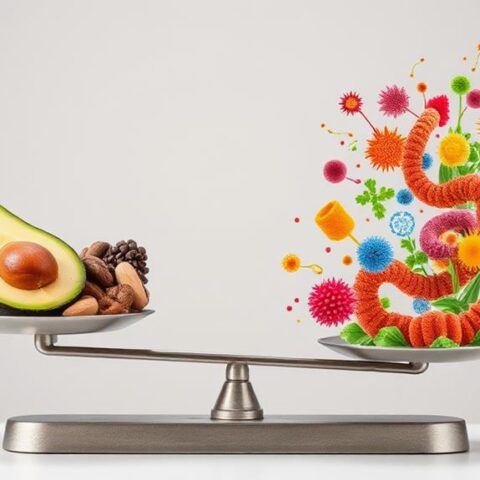
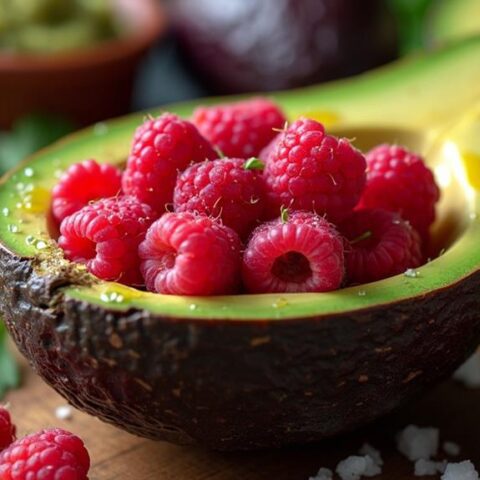
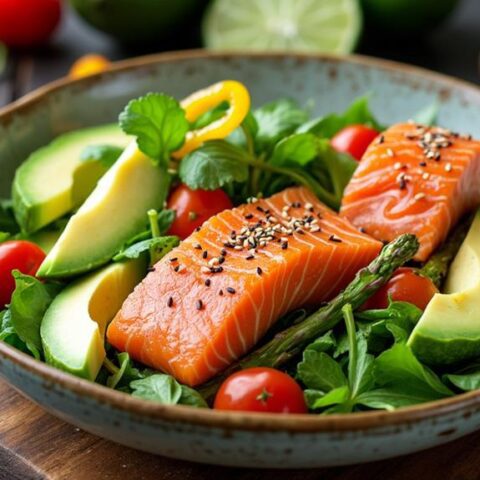

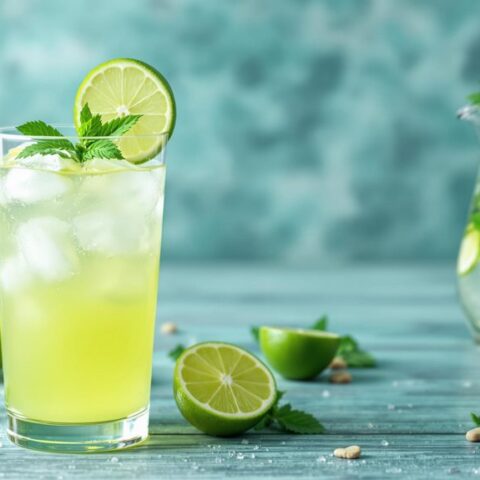





No Comments